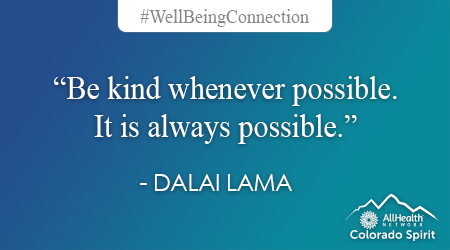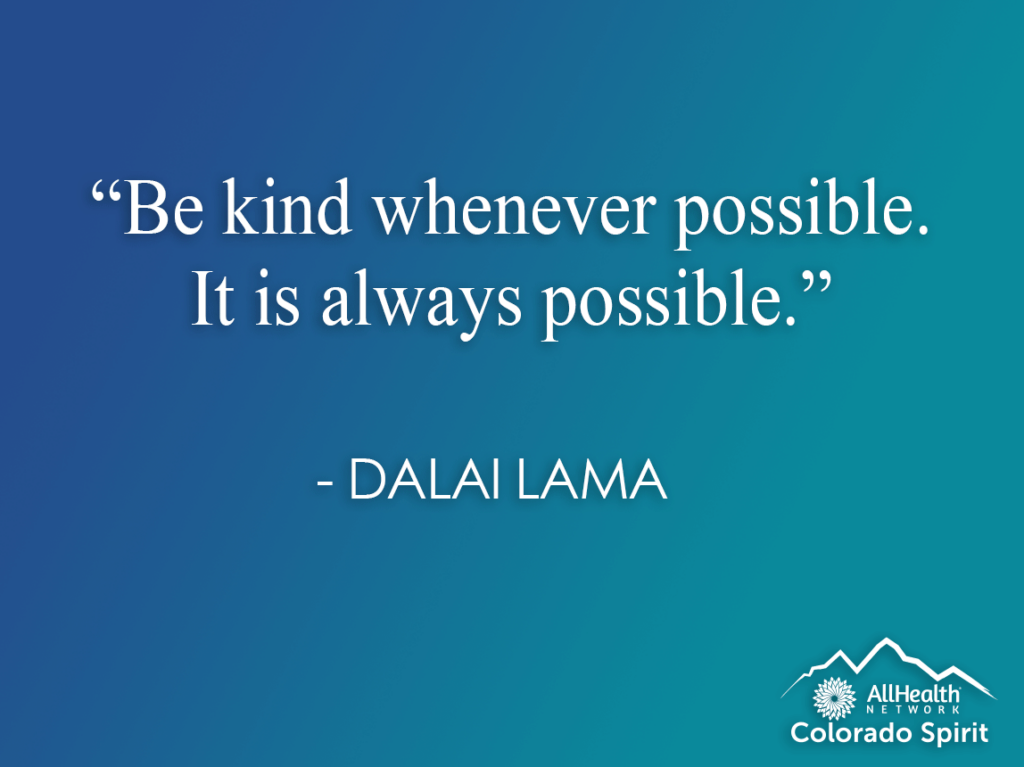Welcome to the Weekly Well-Being Connection! We’ve created this as a resource for our community and want to share the information with our AllHealth Network staff as well. We hope you enjoy reading and maybe even find the information useful to share with clients. We are excited to have Ally Burdick, of the Colorado Spirit team write this week’s post.
It’s just different
There’s no denying that this winter will be a bit different than years past. Not only are we expected to continue staying home and prioritize our community’s health, but we have the added stress of the holiday season approaching and it is well known that the holidays affect people differently than the rest of the year. Due to this year’s additional stress and strains, it’s more important than ever that we prioritize our mental and emotional health and support each other even from afar.
Support one another
According to the Center for Disease Control (CDC), 40% of adults surveyed in June 2020 reported an adverse behavioral health condition. When compared with responses from June 2019, there were increases in reports of anxiety, depression, and substance use. There was also an increase in the number of people who reported they had seriously considered suicide in the past 30 days. This increase was significantly higher among people 18–24 years, Hispanic and Black individuals, unpaid caregivers for adults, and essential workers. While the added stress of the pandemic is not something we can feel individually responsible for, together we can take necessary precautions to support one another.
While it is essential to stay informed and up to date on our community’s health, limiting time on social media can significantly decrease stress levels. Instead, consider connecting virtually with loved ones in an effort to set boundaries regarding pandemic-related conversations and make time for meaningful exchanges.
Adjust for stability
This year has tested our creative efforts in finding safe and effective ways to increase our mental and emotional stability. Adjusting to a new norm that includes stay-at-home orders, remote learning, and working from home can feel uneasy, however resisting the change can be more harmful than helpful. Encourage yourself and your loved ones to utilize outlets like creating a new walking schedule with your pet (even when it is cold outside) or setting theme nights for family dinners in an effort to maintain positive mental health practices in our current setting. Developing new habits and committing to learning a new skill are also effective ways to allow for a healthier mindset. Inflexibility in routine and increased irritability could be signs of your loved one needing further support.
Know the signs
Knowing the general warning signs of suicide can also help keep you and your loved ones safe. Be aware of changes in behaviors and language. If you find that a loved one has become more isolated, increased their usage of substances, displayed extreme mood swings, or forgone healthy hygiene practices, encourage your loved one to reach out to a professional to get the adequate support they need. Additionally, ensuring your home is a safe space by taking proper precautions with any sharp objects, medications, or firearms inside the house is a way to look after your family members and decrease accessibility to weapons. Additional resources are below as well to help you or someone you know with thoughts of suicide.
Would speaking to someone help?
To speak with someone in the Colorado Spirit Program about stress related to the pandemic, please call 720-707-6789 or visit our web page at www.allhealthnetwork.org/Colorado-Spirit
For information about other services at AllHealth Network or to get connected with ongoing behavioral health support, please call: 303-730-8858.
AllHealth Network is continuing to provide service via telehealth or by phone and our Crisis Walk-in Center remains open 24/7. To learn more about what other community mental health centers are doing, please visit The Colorado Behavioral Health Council COVID-19 website.
If you are experiencing a mental health crisis and are in need of immediate assistance, please call the Colorado Crisis Hotline at 1-844-493-TALK (8255) or text TALK to 38255


